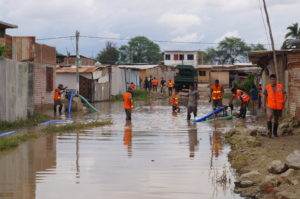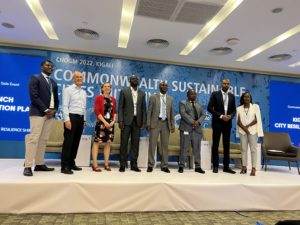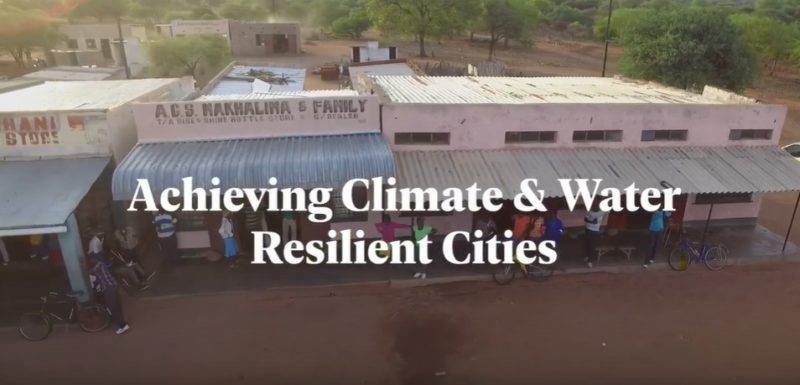New opportunity to help billions of city residents cope with climate change
Climate changeNews
A new alliance calls on leaders to urgently increase funding of flooding, drought, sanitation and waste water management in fast growing cities across the globe.
The time is now to address an urban water crisis which affects billions of people, the alliance said, ahead of a meeting of the Commonwealth heads of Government in Rwanda.
Practical Action, WaterAid, The World Resources Institute (WRI) and The Prince’s Foundation are jointly calling for accelerated action in support of the world’s urban poor.
jointly calling for accelerated action in support of the world’s urban poor.
The organisations came together as part of an initiative calling for action on sustainable urbanisation in the Commonwealth to respond to climate change and chronic underfunding in flooding, drought, sanitation and waste water management in fast-growing cities.
Dr Lucy Stevens, head of urban services at Practical Action said: “This alliance is good news for the 6.7 billion people who will live in cities around the world by 2050. It isn’t too late to do something about urban water provision.
“If we act now, we can ensure that the growth of urban areas does not cause additional harm to the planet and helps in our transition to low-carbon, resilient cities where people can thrive despite the challenges of climate change.”
As climate change causes extreme weather patterns, cities are vulnerable, becoming both wetter and dryer and facing increased flooding and longer droughts which impact on safe water, sanitation and waste-water management.
The issues are particularly acute and urgent in Africa, the world’s most rapidly urbanising continent. There, 1.5bn people are set to live in cities by 2050 and 40 per cent of the population already live in semi-arid and arid regions.
Currently, only a handful of Africa’s 1,765 cities have plans to address the challenge of urban water security.
Nearly 50% of the world’s anticipated urban population growth to 2050 is projected to be within the Commonwealth.
 The organisations will come together to provide opportunities for investors and climate change funds to take existing solutions to scale and explore new ways of addressing the problem.
The organisations will come together to provide opportunities for investors and climate change funds to take existing solutions to scale and explore new ways of addressing the problem.
There are already examples of good practice but these need to scale rapidly. They are not enough on their own and the urgent changes in urban water management called for by the organisations include:
1) Rapid scaling of existing solutions which are locally-led and people-centred. This includes working with empowered and better-resourced local governments.
2) Collaboration between governments, and organisations to share learning and expertise, leveraging the Commonwealth advantage.
3) Huge investment from climate funds, the private sector and governments. Financing for tackling the climate and water emergency is woefully inadequate
Practical Action’s work through the Zurich Flood Resilience Alliance, for example, works on community-based disaster risk reduction in six countries in Africa, Asia and South America, including in urban and peri urban communities.
The project works with over 120,000 people in more than 70 communities, including Nepal and Bangladesh. Five global and national knowledge portals ensure information reaches the people who need it most, with 130,000 visits to the site during the past year.
WRI’s Urban Water Resilience in Africa Initiative has helped six cities develop water resilience profiles and plans for action.
The Mayors of Kigali and Musanze in Rwanda will launch their action plans at CHOGM on 21st June. Their plans are supported by the WRI’s ACWA Fund, which aims to leverage $5bn in funding and financing to support water resilience projects at scale in 100 African cities by 2032.
WaterAid hosts the Resilient Water Accelerator, building on investment from Bank of America, SIDA and Dutch Government, aiming to raise $20million by 2023 to design investible water projects that will drive further private investment, in support of vulnerable communities in six water stressed regions. By 2030 it aims to facilitate $billions in investment in resilient water, improving resilience for at least 50 million people worldwide.
The Prince’s Foundation is collaborating with NYU and UN-Habitat to develop a Rapid Planning Toolkit enabling community engagement in planning, while also working with key Commonwealth partners and associations which collectively provide enormous reach and potential for embedding shared learning and increasing impact.
Dr Stevens added: “By following key principles and scaling up existing examples of good practice, we will be able to ensure people in cities have access to water for drinking, washing and sanitation, are resilient to extreme weather and have a say in how decisions are made.
“We know cities can work with nature for both people and planet. We now need the money to make this happen.”
The alliance will be launched at an event on Sustainable Urbanisation on Tuesday 21st June by Lucy Stevens, where the Mayors of Kigali and Musanze will talk about their water resilience plans developed with support from WRI.

For further information:
Call to Action on Sustainable Urbanisation in the Commonwealth
Practical Action, Zurich Flood Resilience Alliance
WaterAid Water Resilience Accelerator
WRI Urban Water Resilience in Africa | World Resources Institute (wri.org)